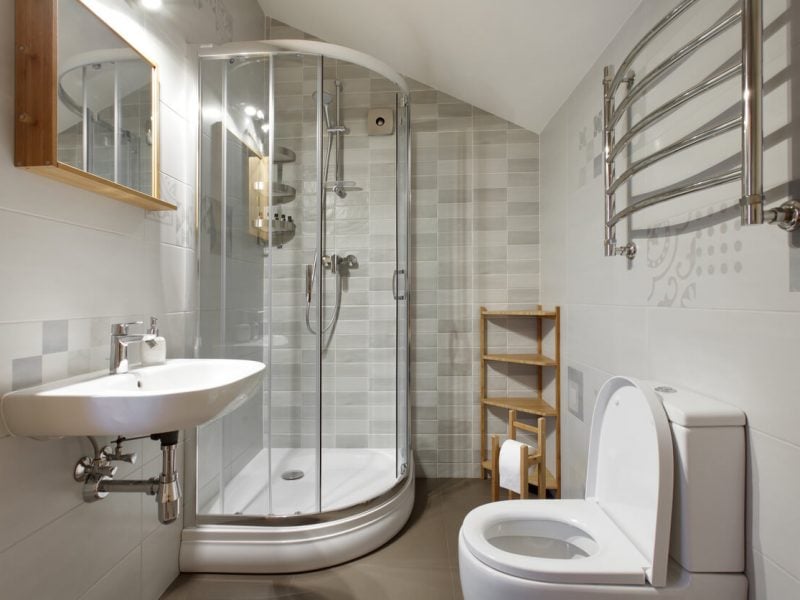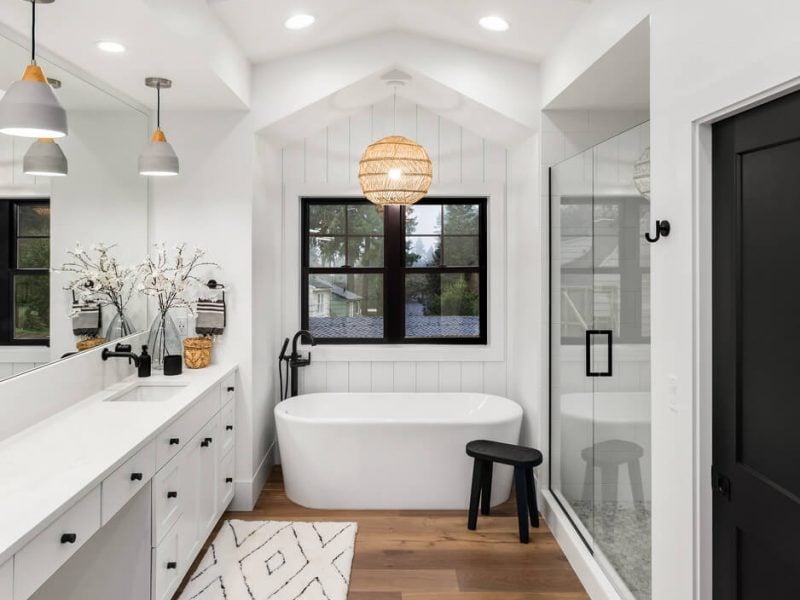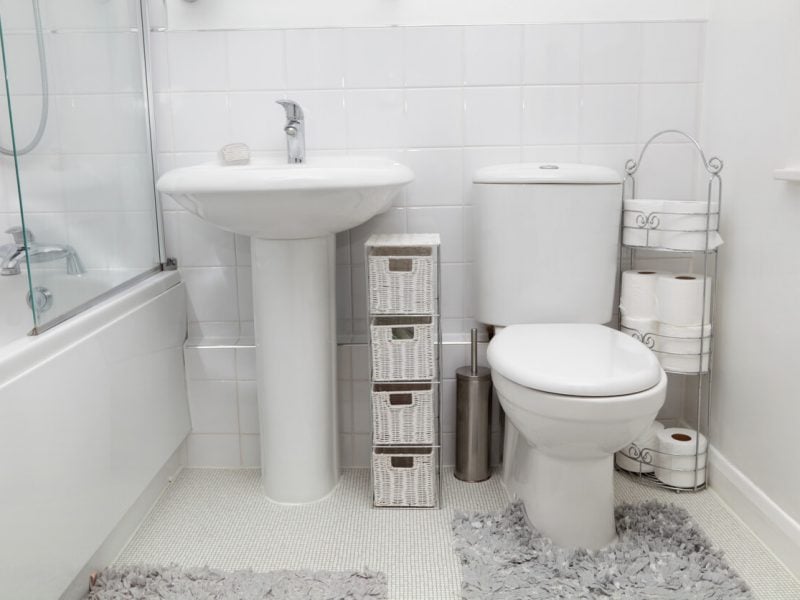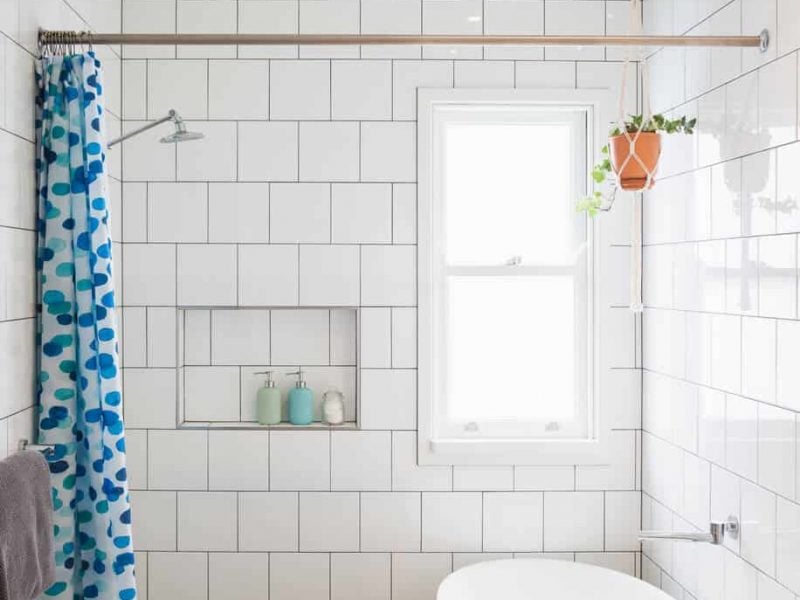Different Types of Showers
Table of Contents
So you’ve decided you want a new shower… why else would you be here? Searching for a new shower to buy can be a hard task… there are so many types of showers and colours to choose from, such as the latest brushed brass showers, which are very on-trend.
Today, we’ll be talking you through the four main different types of showers, which are:
- Digital Shower
- Electric Shower
- Mixer Shower
- Power Shower
Of course, there are more specialised types, and you’ll see lots of different names popping up everywhere, but in terms of finding the best shower for your bathroom, these are the types we will cover in this shower buying guide.
Considerations for Choosing a Type of Shower

Before we talk about the different types of showers you might be tempted to opt for, you will need to know about the different considerations for choosing a shower. Your shower system is a very complex network of water systems, and each water system gives hot and cold water, varying water pressure, and many water flow options.
Water Pressure
First, you’ll need to consider whether your water pressure is typically low or high.
If you do not have high pressure, there are ways to boost this. Water pressure is heavily influential in deciding which type of shower you need because this factor will influence how powerful shower accessories are.
But wait… what is water pressure, I hear you ask? And what pressure do the most powerful showers have?
Water pressure is simply the measure of force to get water flow through a mains system and into your pipework. It’s measured in bars.
To get informed on the type of water pressure, whether your water supply currently comes from mixer showers or digital showers, you can check with your local council and seek professional advice before any major changes are made.
Your water pressure and the changes you may need to make depend on the water system supplying your hot and cold water. This is what we’ll discuss next.
Water System
Now, let’s talk about water systems. The different systems you have for your water supply could easily affect your choice of shower. UK homes are generally built with one of the three water system types described below.
Gravity-fed
If you live in an older house, there’s a good chance your heating or water system is gravity-fed. These types are unfortunately known for having poor pressure and flow of your water supply.
Gravity-fed systems are some of the most common in the country and feature a cold water supply tank in your loft space and a hot water cylinder typically found in an airing cupboard.
Realistically, gravity-fed systems result in low water pressure. However, you can easily install a shower with pump mechanisms to boost the water pressure.
One pump alone could easily feed two or three showers at once, so this is a great option if you have a property with multiple showers and want each to be a powerful shower.
Combi-boiler
A combination boiler is perhaps among
some of the most common water systems in the UK. These boilers rely solely on mains pressure to deliver a hot and cold water supply around your home.
Here, you’ll typically see a wall-hung boiler with no storage water tank, which easily provides you with a hot water supply on demand.
Combi boilers are generally the best for supplying a hot water supply on demand and supply the highest water pressure where possible. Combi boiler systems are compatible with mixer showers to meet these demands.
Unvented
An unvented shower system requires a separate hot water cylinder to store an amount of hot water at mains pressure.
This comprises a metal-clad hot water storage tank and a wall-hung boiler. An immersion heater heats the water in the cylinder, and there you have it!
Once you know your water pressure level and hot and cold water supply, you can think of what accessories you might need and which type of shower you ultimately want to opt for.
Shower Head and Tray
Shower Heads
Next, you’ll want to consider which type of shower head will give you the best control over your preferred temperature inside the shower. Shower heads are important in fulfilling this role for your ultimate showering experience.
As much as your mains water supply and central heating are important for temperature controls within the showering area, the three types of shower heads that you can choose for your bathroom suite design – and its shower unit – are largely influential.
For example, a shower head is generally fixed to the ceiling, creating a high-end feel for your shower bath. In contrast, a riser kit shower head is brilliant for the versatility of water usage.
If you’re a family of 4, you might want to opt for this type of shower head to remove the shower head and adjust its height.
Finally, a combination shower head provides the best of both worlds – you can easily have showers with the head fixed or detached.
Shower Trays
Shower trays are also important to consider when assessing the types of showers you will use in your shower enclosure. Your plumbing will determine whether you opt for a low or high-sided shower tray, and you can even opt for slimline trays which sit flat against the floor.
Shower trays are not as high a priority as other types of accessories for showers when deciding between the mixer and digital showers, but it’s still important to remember that you’ll have to make this choice down the line.
Style and Shape
Realistically, people need the information available to make informed decisions about the designs of their showers.
Whilst features such as a shower pump, hot water system, or even your shower valves are important to consider, aesthetics are also very important to remember.
The two main shower types in terms of designs are ‘contemporary’ or modern showers and ‘traditional’ showers. Whether you’re opting for an enclosure or shower bath, you might want to decide from the outset whether you’d like a contemporary-looking shower.
Contemporary showers often feature:
- clean lines
- simple shapes – i.e. a rectangular, glass shower screen
- no embellishments
Traditional showers often feature:
- rain can shape shower heads
- elegant hooping arms
- vintage valves
- ceramic leavers and additional features
No matter your type of shower – electric, digital, or even power showers- you shouldn’t have to compromise on aesthetics to get a good flow!
Boiler Tank
It’s finally important to consider the variation in flow rate that your hot or cold water tank offers.
If you often find that you’re not short on cold water supplies but often run out of hot water flow, you can address this issue with an electric shower.
The 4 Types of Showers
Here’s our list of the four essential types of showers that you could opt for. Each has very specific mechanisms for giving you hot water and cold water supplies, all from a water tank or similar system.
Digital Shower
Digital showers are ‘groundbreaking alternatives’ to electric, mixer, or power showers. Before we have a more in-depth run-down, here are their key features and advantages:
Main Elements
- Works similarly to a mixer shower, taking hot water flow straight from the boiler
- Some are compatible with smart technology
- They are versatile in that they’re available for all types of hot and cold water supply
Main Benefits
- Finitely monitor water temperature
- Unparalleled control over the flow rate
- Widely heralded through social media
- Can be used no matter the water tanks or boiler system your house employs – no more complicated monitoring of your shower pump or airing cupboard
Perfect For
Anybody who wants to add some high-class technology to their bathroom… whether you’ve got a walk-in shower or rain showers!
These handy showers are packed with technology and are both eco-friendly and user-friendly; their abundance of functionality and settings from an easy control panel means you can easily customise different settings.
If you want greater control over water temperature, trying to get that perfect balance between hot and cold water, it’s easy to achieve this with digital showers.
What’s more, digital showers are perfect for that contemporary look we were just talking about; they sport an aesthetically pleasing minimal design, making for a space-saving, stylish addition to any bathroom.
Electric Shower
Electric showers are brilliantly suited to offering hot temps on demand. They operate by channelling cold water from your mains system and heating it inside the unit. Here’s a rundown of an electric shower’s key features:
Main Elements
- Requires pressure to be at an adequate level, either from a mains system or shower pump
- Not reliant upon boilers or tanks
- Compact, space-saving, and easy installation
Main Benefits
- Thermostatic temperature control for shower experiences tailored to your needs
- Not an issue if you’re having boiler troubles
- Easy to install
- Eco-friendly and energy-saving
Perfect For
Pretty much any homeowner, no matter your water system! Combination boilers are best suited, but the difference is minimal.
Electric showers are known to be widely convenient to many different homeowners. With an electric shower, you get instant hot water that isn’t affected by issues with the boiler.
If you’re having issues with your central heating, this will not affect your electric shower… so you can easily have a soothing, hot stream no matter the situation!
Modern electric showers often have thermostatic control, allowing you to control your temperature to your preference.
A key tip, however, is that electric showers should always have shower installation undertaken by a qualified professional.
Moreover, always remember that electric showers rely on existing water pressure – so if you’ve got a gravity-fed water tank, you’ll probably need a shower pump installed, too!
Mixer Shower
Mixer showers are modern units; as the name suggests, they easily mix hot and cold. The mixture of hot and cold occurs in the shower valve, where the temperature is regulated, and pressure drops are compensated for.
Keep reading for a full description of these brilliantly modern showers, but for now, here are some key features and advantages of the mixer shower:
Main Elements
- Whether a manual or thermostatic model, mixers require a cold and hot supply
- They tend to be more powerful in comparison to electric showers
- Depending on the water pressure
- Concealed styles available
Main Benefits
- Temperature is not affected by water usage anywhere else in the home
- Easily avoid the risk of scalding – so family-friendly
- Easy installation and control of use
Perfect For
Those with a large supply of hot water or with gravity-fed units
Mixer showers are a contemporary solution, perfect for any shower enclosure, regardless of your shower heads and other accessories.
These showers can easily be slotted into most types of bathroom or shower enclosure designs and are compatible with high or low-pressure water systems.
There are generally two types of mixer showers – a thermostatic mixer and a manual mixer. Unlike a thermostatic mixer, a manual device manually mixes the different water temperatures.
Thermostatic shower designs, however, incorporate a thermostatic valve to keep water at a constant temperature.
Thermostatic showers are brilliant for families who are worried about a heating element scalding the little ones.
Either type of mixer shower would make a brilliant addition to your home, though you should remember that some thermostatic mixers require an electric pump to increase the flow rate.
Power Shower
Our final type of shower is the power shower. A brilliant bathroom addition for those whose homes need a luxurious feel, power showers will meet all of your showering needs.
Check out the key features and range of advantages below!
Main Elements
- Requires a heating element for both hot and cold water
- The best water pressures are offered
- Tend to use more water than other shower models
Main Benefits
- Luxurious spa relaxation
- Premium temperature and heating systems
- A sleek look and feel in your bathroom
- Ideal for gravity-fed units
Perfect For
Those who like a little pampering or need to boost their water pressure – such as if you own a gravity-fed unit for your shower.
Remember the feeling of going to a hotel or spa away from home, going to your room’s bathroom, and hopping in the shower? Well, you can get that right at home.
Power showers are invigorating and luxurious, with a supreme flow rate and even the option of body jets. They look sleek and sleeker – so it’s clear your home needs one of these in the bathroom.
Power showers are popular with those who enjoy the experience of relaxation, as they incorporate massage jets such as specialised body jets. These high-performance jets are rarely found elsewhere in other products.
Whilst consuming more water and energy than some showers, these are perfect for those who want premium pressure and temperature controls in their bathroom… if you’re this type of person, definitely consider a look at power shower options.
How Will I Choose the Type of Shower?
Now that you’ve had a gander at each example of shower products in this guide, we’ve come to the bit of the article for you to decide. It’s hard to know exactly which shower is best for your showering needs, but if you follow our advice, you’ll find a means of selecting a shower that will work for you.
Our range of luxury showers can easily be accessed and explored to find the best showering experience, whether a walk-in shower or shower enclosure.
Here’s a quick round-up of what you’ll need to consider before opting for a shower type. Do remember that these suggestions will vary across households.
- Plumbing type and water unit models – i.e. gravity-fed versus combi-boilers.
- Flexibility of styles – i.e. the height of the enclosure or walk-in
- Power requirements- i.e. water pressure
- Range of shower accessories and networks, such as your shower tray and shower valve
At the end of the day, selecting the type of shower, you’d want in your home, or the type you need mostly comes down to personal preference and personalised lifestyle. Carefully read the tips above, and browse for your perfect shower.
FAQs
What shower should I get if I have a combi-boiler?
If you have a combi boiler, you’re better off opting for a mixer or electric shower. An electric shower is very easy to use as you’ll only need cold water, which is heated inside the shower unit.
What is a thermostatic shower?
A thermostatic shower takes water from existing supplies and incorporates a pre-set thermostatic valve to regulate water temperatures and keep them consistent.
We’re sure you remember the pain of when your shower goes cold the minute somebody else will need to use water elsewhere… but thermostatic models avoid this problem entirely!
In many a case, people tend to prefer thermostat models because they avoid scalding issues. This is a top idea if you have children who could easily become burnt from unregulated hot water. Showering safety is guaranteed with this device!
How do electric showers work?
An electric shower is something that works very easily and effectively compared to others.
An electric shower operates through a feed of cooler water into the main area, which is then heated and released via the showerhead. These shower versions are efficient because they’re not reliant upon your boiler’s work!
What is a mixer shower?
As we explained above, a mixer shower connects to cold and hot water supplies, mixing the two together in a valve before releasing it via the showerhead.
These models are more efficient, perhaps more efficient than an electric shower because they are both more powerful and capable of providing premium water pressure. An electric shower, on the other hand, will have a lower flow rate at higher temperatures.
How to fit a mixer shower:
As shower fittings go, it’s generally pretty easy to fit a mixer – and you can use this to your advantage. Here’s a quick step-by-step advice guide on how to install a mixer so that it can work for you.
- Locate your hot and cold supplies and isolate them
- Run the pipes from this location towards the shower – this can be under the floor
- Flush pipe works to remove any dirt or waste
- Place the shower valve against your wall to work out how much outlet piping you’ll need, and cut them to size
- Drill the holes for your valve – using a diamond-tipped tile drill if drilling into tiles







